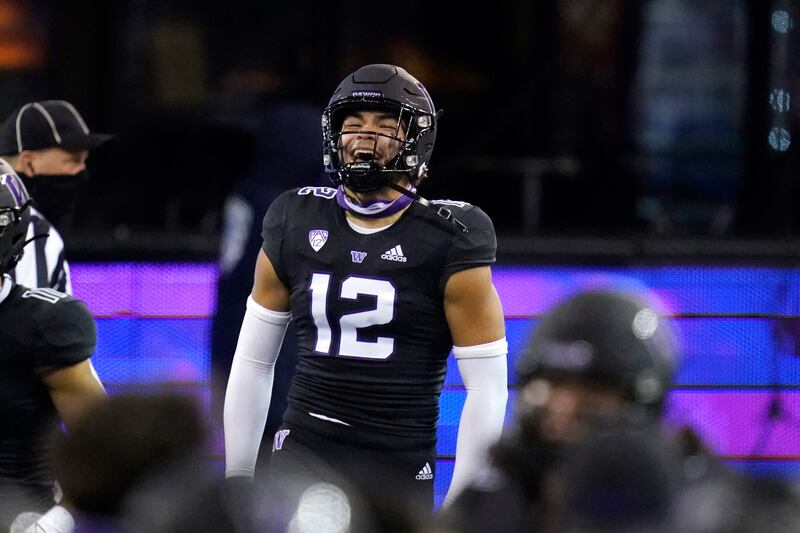The mariners and migrants of college athletics were just tossed a morsel of hope this week.
They’ll play.
Immediately.
If an expected rule change is formally adopted in the coming weeks, that will be reality. The race to bag free agents in college sports will be on.
An NCAA committee recommended a change in the rules allowing transfers a one-time free change of schools without penalty, without sitting out a year, immediately becoming eligible to play for their new team.
The rule is expected to be adopted by the NCAA. It just made workouts and preparation more engaging for a lot of athletes, including transfers to local schools who were kind of holding their collective breath on what they’ll be doing this coming summer, fall and winter as to competition.
Some of these potential impact players include Washington freshman receiver Puka Nacua, who left Seattle for BYU, joining his brother Samson (from Utah), who doesn’t come under this rule because he is a senior graduate transfer, and Oregon State defensive back Kaleb Hayes.
It also includes Utah’s new basketball transfer, freshman guard Gabe Madsen from Cincinnati, whom new coach Craig Smith signed soon after being hired at Utah, and former USU guard Rollie Worster, who announced Thursday that he would follow Smith from Logan to Salt Lake. Another Ute transfer recruit rumored to be onboard, David Jenkins Jr., from UNLV, would be in the same situation as BYU-bound Samson Nacua, not falling under any restrictions because he is a senior grad transfer.
Some argue this is a long overdue.
After all, coaches move to other schools all the time — regardless of contracts — and immediately start working elsewhere.
Local examples include Mark Pope from Utah Valley to BYU and Smith from Utah State to Utah. On the national scene just recently, Texas Tech’s Chris Beard left for rival Texas; Shaka Smart left Texas to Marquette; and T.J. Otzelberger departed UNLV for Iowa State.
The statement is made that if it’s good for coaches to just up and leave when they want to, players should be extended the same opportunity.
On the other side, traditionalists say this kind of move might seem fair for players, but would create chaos on rosters, disrupt high school recruiting because coaches would shop the transfer portal for quick help, and hinder coaches striving to motivate players to work harder for playing time by dangling an easy parachute.
Purdue basketball coach Matt Painter, who is a member of the National Association of Basketball Coaches, wrote a letter to the NCAA committee studying this open transfer policy.
“Every classification of student-athletes — both current and prospective — would experience uncertainty,” Painter wrote. “The annual roster turnover would make college choices more difficult for high school prospects, and current student-athletes contemplating transfer would have less certainty with which to make decisions.
“As a coach, the ability to effectively teach and lead a program would be more difficult. And perhaps most significantly, remaining student-athletes would be left in an untenable situation in the likely event of a mass exodus of teammates in a single off-season.”
The threat of playing musical chairs is real.
There is no question that quick fixes as seen by Pope with Jake Toolson, Alex Barcello and Matt Haarms, work.
But it’s also proven they have consequences, like when the Cougars’ Kolby Lee, Connor Harding, Wyatt Lowell and Jesse Wade put their names into the transfer portal after the season.
It does make things more complicated, but it also provides quick and immediate opportunities for the schools, players, coaches and teams.
Look no further than recently crowned national champion Baylor, which had two transfers start and a third see significant time in the title run by the Bears, including the talented MaCio Teague, who transferred from UNC Asheville. No. 2 seed Houston had four transfers who made an immediate impact.
Villanova’s 2018 national championship team benefited greatly from the transfer of Fordham’s Eric Paschall.
Sports Illustrated’s Ross Dellenger put it this way, quoting Oakland men’s coach Greg Kampe.
“On the heels of the NCAA’s decision to allow college athletes to freely transfer and play immediately, Greg Kampe has a message for basketball coaches everywhere: Change the way you recruit or see your career go up in flames.
“‘If you are building for the future,’” the longtime Oakland men’s coach is quoted as saying, “you’re going to lose your job.’”
In other words, right now, with soon-to-be 2,000 athletes in the transfer portal where there are 1,200 right now, the game has changed dramatically.
It’s all about instant fix, instant gratification and winning now.


